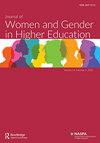Toward a Methodology of Healing: Promoting Radical Healing Among Student Survivors Through Research
Q2 Social Sciences
Journal of Women and Gender in Higher Education
Pub Date : 2023-01-02
DOI:10.1080/26379112.2023.2168278
引用次数: 0
Abstract
To resist hegemonic campus sexual violence research trends rooted in postpositivist paradigms, I advocate for the centering of healing in research, particularly in the research methodologies that scholars employ. In this article, I invite researchers to (re)consider the purpose of research as a process that actively prioritizes and promotes radical healing among student participants. By envisioning culture as an asset for healing, centering relationality and community, and embodying trauma-informed practices, researchers can employ methodologies that support radical healing among minoritized survivor participants. I describe my conceptualization of a methodology rooted in healing, integrating discussion of my positionality and professional pursuits that have informed my definitions of healing and understandings of the possibilities of a healing methodology. I then share some examples of potential methods that align with a healing methodology, such as thé talks, virtual semi-structured interviews, and photo-elicitation. Through attention to the physical environment and interpersonal context, engaging in contemplative practices, promoting principles of trauma-informed care, and centering relationality, embodying a methodology of healing can foster healing among participants through the very act of engaging in specific methods and the research process. I demonstrate the potential transformative nature of these methods by sharing participant narratives from two critical qualitative studies centering Women and Femme Student Survivors of Color in which I employed these methods. I conclude by illustrating the significance of a healing methodology—its ability to invite higher education scholars to question the very purpose of research and shift to center participant communities as the primary audience of scholarship, ultimately fostering radical healing. By employing a healing methodology, scholars can promote equity and justice for individual participants while working toward broader social change.走向治愈的方法论:通过研究促进学生幸存者的彻底治愈
为了抵制根植于后实证主义范式的校园性暴力研究的霸权趋势,我主张在研究中以治疗为中心,特别是在学者使用的研究方法中。在这篇文章中,我邀请研究人员(重新)考虑研究的目的,作为一个过程,积极优先考虑并促进学生参与者之间的彻底治愈。通过将文化设想为治疗的资产,以关系和社区为中心,并体现创伤知情实践,研究人员可以采用支持少数幸存者参与者激进治疗的方法。我描述了我对一种根植于治疗的方法论的概念化,整合了对我的立场和职业追求的讨论,这些讨论告诉了我对治疗的定义和对治疗方法论可能性的理解。然后,我分享了一些与治疗方法相一致的潜在方法的例子,例如演讲,虚拟半结构化访谈和照片引出。通过关注物理环境和人际关系,参与沉思实践,促进创伤知情护理原则,并以关系为中心,体现一种治疗方法,可以通过参与特定方法和研究过程的行为来促进参与者之间的治疗。我通过分享两项关键定性研究的参与者叙述来展示这些方法的潜在变革性质,这些研究以有色人种女性和女性学生幸存者为中心,我在研究中使用了这些方法。最后,我举例说明了治疗方法的重要性——它能够邀请高等教育学者对研究的真正目的提出质疑,并将中心参与者社区作为奖学金的主要受众,最终促进彻底的治疗。通过采用治疗方法,学者们可以促进个人参与者的公平和正义,同时致力于更广泛的社会变革。
本文章由计算机程序翻译,如有差异,请以英文原文为准。
求助全文
约1分钟内获得全文
求助全文
来源期刊

Journal of Women and Gender in Higher Education
Social Sciences-Gender Studies
CiteScore
1.40
自引率
0.00%
发文量
20
 求助内容:
求助内容: 应助结果提醒方式:
应助结果提醒方式:


